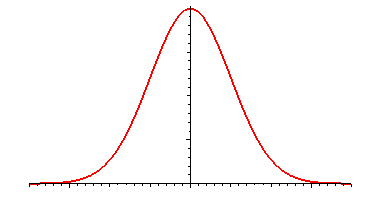
Note on edit: This is basic calculus, which deals with the areas under a curve. It may be confusing to some.
Here's a generic bell curve. Let me use it to illustrate current political behavior and to create a theory that we can discuss. The left side of the center line is generally liberal or Democratic, and the right is conservative. Notice the center line. Clustered around that is the area of the curve that represents the bulk of the voting population. As we've seen for some time, voting is almost evenly divided between Democrats and Republicans over a long period of time. So...what changes to swing elections from one party to the other?
What changes is the position of the center line. When the line shifts to the right, the Democrats win. When it shifts to the left, Republicans win. Why? Because the curve represents voters. The more the area under the curve to the left or right of the center line indicates how the election results will turn out.
Remember Goldwater? He was very popular with the right wing of the Republican party. He got the nomination for the Presidency. That shifted the centerline to the right, and quite a ways to the right. He lost miserably, because more voters were to the left of that shifted center line and voted for the Democrat.
We're looking at a similar situation in 2010. The Tea Party candidates are serving in the role Barry Goldwater filled. They shift the center line of the bell curve to the right. What that means is that more people end up to the left of that center line. It happened in 2008, when Sarah Palin was the Vice Presidential candidate. She shifted the center line to the right, too. The result was the election of Barack Obama and an increased majority in both houses of Congress.
I believe that we are seeing the same process in effect in the congressional races in 2010, at least in those states where Tea Party candidates have won their primaries. The center line is shifted. The area under the left side of the curve is larger, and that means more votes for the Democratic candidate.
Is this theory of mine sound? We'll find out in November. What do you think?